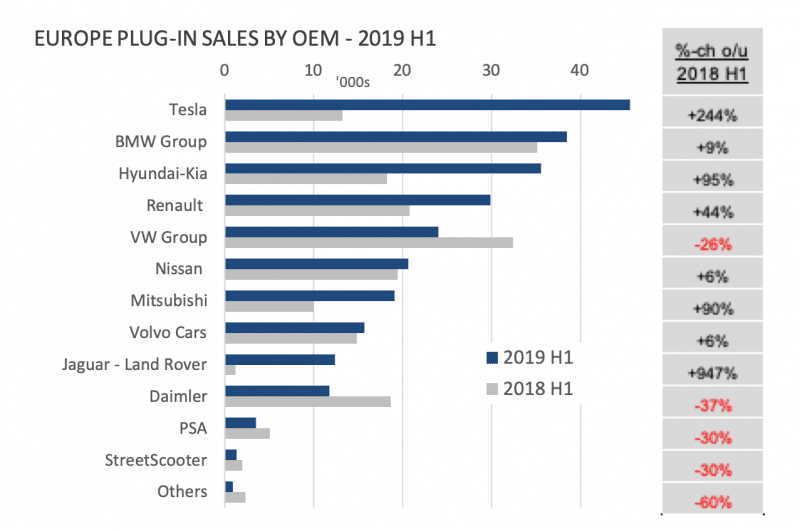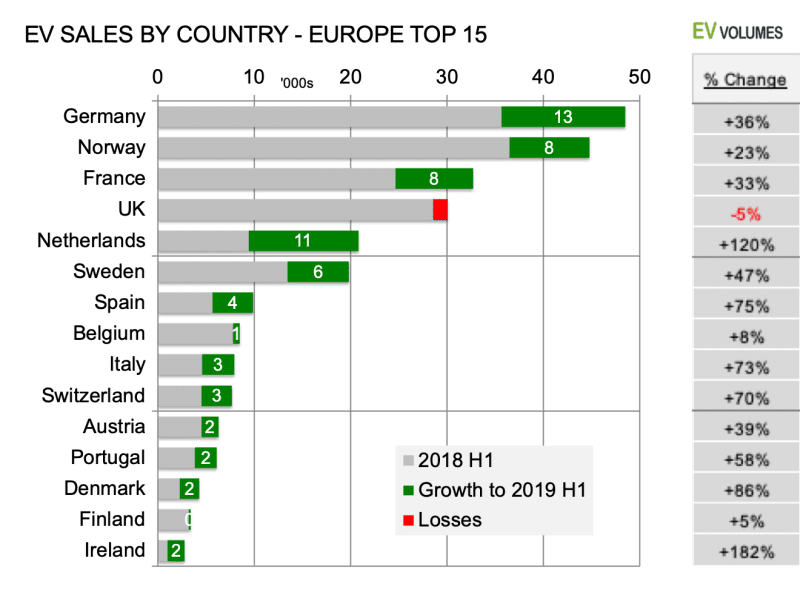Electric car sales in Europe continued on an upward trend for the first half of 2019, with Model 3 sales driving an increase by one-third on the same time in 2018, including battery electric (BEVs) and plug-in hybrid (PHEVs) passenger and light commercial vehicles.
Despite comments from BMW executive Klaus Frölich in July that Europeans prefer plug-in hybrids and are not that keen on battery electric cars, the new data from sales database EV-Volumes, shows a 79% increase in BEV sales – proving, in fact, that the opposite is true.
A “profound shift” was observed towards battery electric vehicle sales in H1 2019 according to EV-Volumes, with a lot of jostling in ranking by various carmakers after Tesla introduced its mass-market Model 3 electric sedan.
Sales share for BEVs increased from just over half (51%) in H1 2018 to over two-thirds (68%) of the entire electric vehicle market (259,000 units), reflecting the introduction of stricter WLTP ratings, better supply and choice of BEV models and changes in policy and grants designed to promote more BEV uptake.

PHEV sales on the other hand suffered with a 13% drop in sales in the first half of 2019 with 12,300 less units sold.
Tesla, as in the US, claimed first place as most popular electric carmaker delivering 38,000 units – a 244% increase in sales driven by Model 3 sales, knocking BMW of its perch (it held onto second place though thanks to a small growth in i3 electric and i8 PHEV sales).
Volkswagen, which has long maintained strong sales volume thanks to its all-electric Golf, suffered the most in terms of volume losing 26% of sales while drivers await new upgrades to its PHEV models (which include a Golf GTE and Passat GTE) and no doubt the loudly heralded all-electric ID series.
Hyundai/Kia saw a doubling of sales bringing it into third place while Renault saw a 44% increase in sales that gained it fourth place compared to H1 2018.
While Daimler also saw a significant drop in sales with upgrades to PHEV offerings due for H2 2019, Jaguar Landrover saw an almost 1000% jump in sales – given the I-Pace all-electric SUV only became available in April 2018 this is no surprise.

Country to country, growth in the EV market was most marked in Germany finally knocking EV leader Norway off its perch despite a lack of supply of PHEV models.
According to EV-Volumes, this was also largely due to the Model 3 (5,350 of which were sold in Germany) but also thanks to the Renault Zoe (5550 units, +106 %), BMW i3 (4520 units, +84 %) and the Mitsubishi Outlander PHEV (4130 units, +520 %).
The introduction of the Audi e-tron quattro and the Hyundai Kona EV, neither of which were available in H1 2018, also contributed to this win for Germany adding about 1800 units each.
EV sales continued on an upward trend in most other European countries with the exception of the UK, whose departure from the EU draws inevitably closer and which saw a pullback on subsidies with PHEVs no longer covered and EV subsidies reduced by £1,000 ($A1,800 approximately converted).

Not to be outshone by Germany, Norway is still the leader in terms of overall auto market share, with an analysis of BEV vs PHEV from country to country showing the Scandinavian EV juggernaut with a 47% share YTD and 73% increase in BEV vs PHEV.


Bridie Schmidt is associate editor for The Driven, sister site of Renew Economy. She has been writing about electric vehicles since 2018, and has a keen interest in the role that zero-emissions transport has to play in sustainability. She has participated in podcasts such as Download This Show with Marc Fennell and Shirtloads of Science with Karl Kruszelnicki and is co-organiser of the Northern Rivers Electric Vehicle Forum. Bridie also owns a Tesla Model Y and has it available for hire on evee.com.au.

